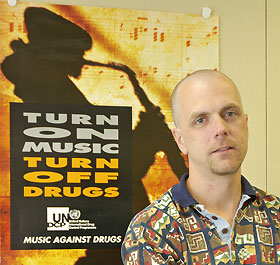For more archives, go to the Advance Archive/Search Page.
Substance Abuse Coordinator To
Help Students Make Right Choices
Thomas Szigethy knows he has a tough job. He's being asked to fix a problem for which there are no easy answers; work with students who often don't think they need help; and convince those who see themselves as invincible that they are vulnerable.
 |
Thomas Szigethy is director of the new Office of Alcohol and Other Drug Education and Services.
|
As the new director of the Office of Alcohol and Other Drug Education and Services at UConn, Szigethy (pronounced Zigethee) must find ways to change a culture - widespread among colleges - where, for many students, drinking or abusing drugs is a way to mask pain, gain acceptance, or find liquid courage.
"Success will come one student at a time," says Szigethy, who joined UConn July 1. "It's about helping students make the right choices."
Szigethy has been helping people make the right choices for 15 years, as a caseworker and social worker for state family and child welfare agencies in Massachusetts and Connecticut. In his last such role, working for Connecticut's Department of Children and Family Services, he began training other workers in the field and enjoyed the instructional aspect of the job.
In early 2003, he took that love of training to Eastern Connecticut State University, where he was named substance abuse coordinator. He applied for the director's job at UConn when the position was created last year, one of about 50 recommendations made by the President's Task Force on Substance Abuse.
Szigethy says he's looking forward to the challenge. He has already started, training a group of about 15 people who will work in the BASICS Program (Brief Alcohol Screening and Intervention for College Students), a one-on-one counseling and alcohol intervention program for students who are edging close to dependence. He also is working with Janice Wilbur, director of HEART House and UConn's substance abuse coordinator, to enhance the year-old Choices Program, which works with groups of 10-15 students who are beginning to experiment with alcohol and other substances. The CHOICES groups discuss making healthy choices as they progress through college, and look at where they may be going awry.
Szigethy also is heading a federal grant proposal that addresses several programs, including funding for the establishment of the BASICS Program, and will provide off-campus outreach while working with the community.
"The community involvement is very important, and it has worked at other universities," Szigethy says. The key to the community groups, he says, is for area residents to meet students, even if they have to go door-to-door, and discuss various aspects of living in Mansfield, letting the students know they're part of the community.
Community assistants (formerly known as resident assistants) have been trained to recognize the various drugs, and how to handle situations involving substance abuse.
"If you know the facts you can help people," he adds. "We want students who are abusing substances to understand that what they are doing is lowering their standard of life, not just today, but for their entire lives."
In addition to community assistants, Szigethy is currently training interns, graduate assistants, and members of the campus ministries to work in the various programs and to reach out and bring other students who would like to help their peers into the fold. Szigethy added he is always seeking faculty, staff, and students who are willing to help.
"There are things we can do, but there's no silver bullet," he says. "Underage drinking is a billion-dollar industry, the lobbying is fierce, and there are no federal agencies that regulate alcohol. So we have our work cut out for us. But it is an interesting time. The nation is finally starting to stand up and say, 'We have an underage drinking problem.' We can use this opportunity to educate people to be able to make healthy choices."
The first event to be offered through Szigethy's office, co-sponsored by the Women's Center, is a presentation by Jean Kilbourne, "Deadly Persuasion: Advertising and Addiction," exploring the crucial role the media play in shaping people's perceptions of alcohol and women. The event will take place in the Student Union movie theater on Sept. 14 at 7 p.m. Admission is free.

